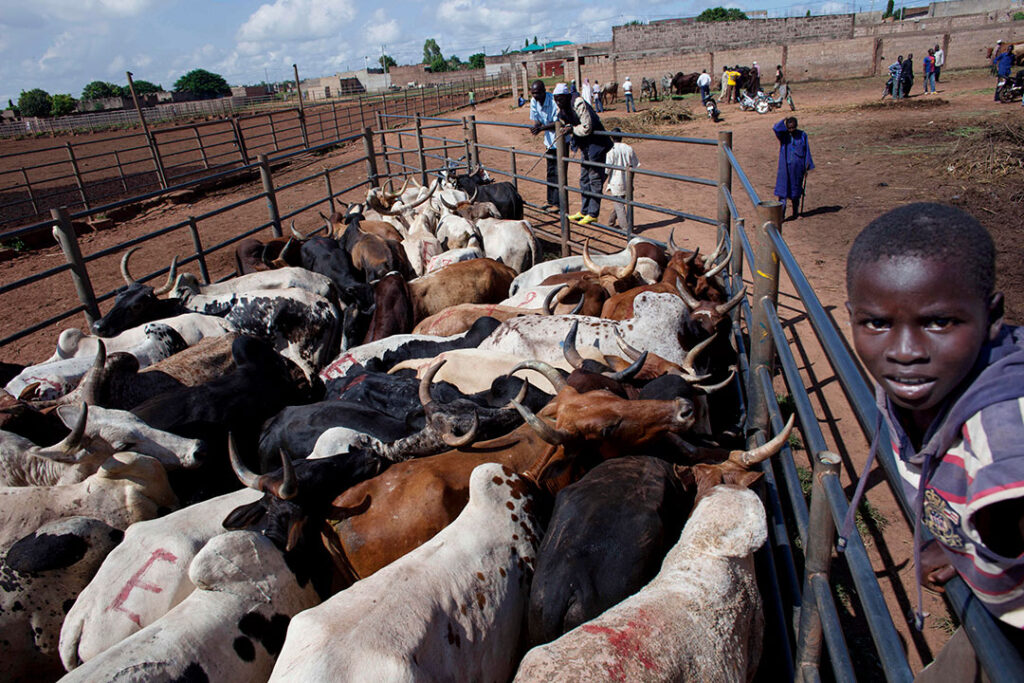In the cattle markets of northern Ghana, butchers and brokers have decades of experience buying cattle from herders in Burkina Faso. Lately, the people selling livestock have been looking for quick sales and taking unusually low payments, a likely sign that the cattle are stolen.
“In the past, there was sometimes stolen livestock in the market,” a butcher identified by the pseudonym Endinene told The New Humanitarian. “But it was small amounts, and not frequent. However, since the war began, everything has changed.”
These days, Endinene estimates that half of the cattle he buys are stolen. The sellers accept half or less of what livestock would normally go for in Ghana.
Across the Sahel, cattle rustling has become a major source of revenue for terrorist groups launching attacks in Burkina Faso, Mali, and Niger. The cattle are often stolen from Fulani herders as a form of an obligatory Islamic charity payment called zakat. The thieves load the animals onto trucks and ship them across the border to Ghana for sale and processing. While terrorists benefit financially, the scheme cripples economies in rural areas, increasing instability across the region.
The New Humanitarian reported that a Fulani herder in Burkina Faso identified by the pseudonym Mohammed had his cattle stolen in October 2023 by eight armed men on motorcycles. They arrived at the pasture outside Biyanga and demanded the six herders there turn over their cattle. The men were part of Jama’at Nasr al-Islam wal-Muslimin (JNIM), the terrorist coalition fighting across the region.
JNIM isn’t alone in rustling cattle. Islamic State West Africa Province (ISWAP) fighters also steal cattle, as do some members of Burkina Faso’s Volunteers for the Defence of the Homeland (VDP) militia who are recruited to fight both JNIM and ISWAP. VDP members either loot animals from communities they accuse of being allied with JNIM or serve as intermediaries mixing stolen cattle in with legitimate livestock before shipping them to markets.
The sale of stolen cattle funds weapons, fuel, motorbikes and other resources for terror groups, according to the Global Initiative Against Transnational Organized Crime (GI-TOC). The initiative found a direct connection between a rise in extremist violence and a rise in cattle rustling.
“This alignment of interests between powerful economic actors in coastal states and conflict-related actors in the Sahel entrenches the status quo and undermines peacebuilding efforts,” researchers with the GI-TOC wrote recently.
Before JNIM arrived in Burkina Faso in 2017, livestock accounted for 10% of the country’s gross domestic product. The Ministry of Animal and Fisheries Resources reported that the country was home to 9.6 million cattle, 15 million goats, and 10 million sheep.
Since JNIM arrived, the U.N. Food and Agriculture Organization estimates that over 8 million head of livestock have been stolen. As of 2024, 70% of the livestock in southwest Burkina Faso had disappeared, presumably stolen to fuel extremist activities, according to a report by the Clingendael Institute. That theft means economic devastation for herders and rural communities across the region, driving instability. Those same cattle were a crucial source of dairy products, leather, and fertilizer for croplands.
Some herders sell their animals to avoid having them stolen, according to Flore Berger, a senior analyst with GI-TOC’s Sahel observatory.
“Being a herder today is almost impossible. And keeping larger herds is definitely more of a challenge and a hassle than a benefit,” Berger said during an online discussion of the Initiative’s cattle rustling report.
Along with destabilizing rural economies in Burkina Faso, cattle rustling also erodes relationships between ethnic communities and destroys public trust in the central government’s ability to defeat terror groups. That creates more opportunities for JNIM to recruit new members,
“This makes actors like JNIM stronger in the long run,” Berger said.

